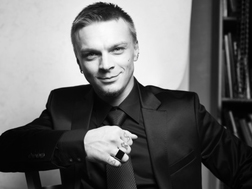Azerbaijan, Baku, May 25 / Trend V.Zhavoronkova /
Eurovision-2001 song contest Estonian winner Tanel Padar supports Justice for Khojaly campaign.
Padar signed a petition within this campaign at a press-conference in Baku on Friday.
The international information and propaganda campaign "Justice for Khodjaly", declared on the initiative of the General Coordinator of the OIC Youth Foundation on Intercultural Dialogue of Islamic Conference Youth Forum, vice-president of the Heydar Aliyev Foundation, Leyla Aliyeva, started on May 8, 2008.
Padar said that he was invited to the Khojaly refugees' camp in Pirshagy.
"I saw many very good people with very hard memories of last twenty years," Padar said.
He expressed hope that there are people in Europe who will know about this event.
Padar stressed that the most important and sad thing is that civil people die in such kind of events, even if it is a fault of good or bad politicians.
"Concerning Khojaly I knew nothing about this event before February when I was invited to a conference organized within Justice for Khojaly campaign in Estonia. But one is to hear about this event, and other - to meet with people harmed by it," he said.
Padar said that there are a lot of Estonian people who came to Baku when the first oil well was made to try to find jobs. He expressed hope that Estonia and Azerbaijan will be able to exchange culture and deepen friendship ties.
He said that he had an opportunity to promote Justice for Khojaly campaign in his country.
"I want people of Estonia to know about it. It is emotionally hard," Padar said.
He also stressed that with this regard he even can speak with Estonian Parliament.
The Armenian military forces committed genocide in Khojaly on Feb.26, 1992. More than 600 people were killed, including 63 children, 106 women and 70 old men. Some 487 civilians were disabled during the genocide. In addition, 1,275 peaceful residents were taken hostage, while the fate of 150 remains unknown.






